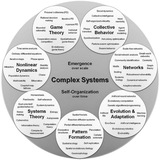🔵 The relevance of #thermodynamics to #economics
The physical theory of thermodynamics is based on two laws: The first law states that energy is neither created nor destroyed in any isolated system (a conservation principle). The second law of thermodynamics — also known as the entropy law — states that energy tends to be degraded to ever poorer qualities (a degradation principle).
Georgescu argues that the relevance of thermodynamics to economics stems from the physical fact that man can neither create nor destroy matter or energy, only transform it. The usual economic terms of 'production' and 'consumption' are mere verbal conventions that tend to obscure that nothing is created and nothing is destroyed in the economic process — things are only being transformed.
A primary objective of ecological economics (EE) is to ground economic thinking and practice in physical reality, especially in the laws of physics (particularly the laws of thermodynamics) and in knowledge of biological systems. It accepts as a goal the improvement of human well-being through development, and seeks to ensure achievement of this through planning for the sustainable development of ecosystems and societies. Of course the terms development and sustainable development are far from lacking controversy. Richard B. Norgaard argues traditional economics has hi-jacked the development terminology in his book Development Betrayed.
The physical theory of thermodynamics is based on two laws: The first law states that energy is neither created nor destroyed in any isolated system (a conservation principle). The second law of thermodynamics — also known as the entropy law — states that energy tends to be degraded to ever poorer qualities (a degradation principle).
Georgescu argues that the relevance of thermodynamics to economics stems from the physical fact that man can neither create nor destroy matter or energy, only transform it. The usual economic terms of 'production' and 'consumption' are mere verbal conventions that tend to obscure that nothing is created and nothing is destroyed in the economic process — things are only being transformed.
A primary objective of ecological economics (EE) is to ground economic thinking and practice in physical reality, especially in the laws of physics (particularly the laws of thermodynamics) and in knowledge of biological systems. It accepts as a goal the improvement of human well-being through development, and seeks to ensure achievement of this through planning for the sustainable development of ecosystems and societies. Of course the terms development and sustainable development are far from lacking controversy. Richard B. Norgaard argues traditional economics has hi-jacked the development terminology in his book Development Betrayed.
💰 The relevance of thermodynamics to economics
https://en.wikipedia.org/wiki/Nicholas_Georgescu-Roegen#The_relevance_of_thermodynamics_to_economics
The physical theory of #thermodynamics is based on two laws: The first law states that energy is neither created nor destroyed in any isolated system (a conservation principle). The second law of thermodynamics — also known as the #entropy law — states that energy tends to be degraded to ever poorer qualities (a degradation principle).
Georgescu argues that the relevance of thermodynamics to #economics stems from the physical fact that man can neither create nor destroy matter or energy, only transform it. The usual economic terms of "#production" and "#consumption" are mere verbal conventions that tend to obscure that nothing is created and nothing is destroyed in the economic process — everything is being transformed.
The science of thermodynamics features a #cosmology of its own predicting the #heat_death_of_the_universe: Any transformation of energy — whether in nature or in human society — is moving the universe closer towards a final state of inert physical uniformity and #maximum_entropy. According to this cosmological perspective, all of man's economic activities are only speeding up the general march against a future planetary heat death locally on earth, Georgescu submits. This view on the economy was later termed '#entropy_pessimism'. Some of Georgescu's followers and interpreters have elaborated on this view.
https://en.wikipedia.org/wiki/Nicholas_Georgescu-Roegen#The_relevance_of_thermodynamics_to_economics
The physical theory of #thermodynamics is based on two laws: The first law states that energy is neither created nor destroyed in any isolated system (a conservation principle). The second law of thermodynamics — also known as the #entropy law — states that energy tends to be degraded to ever poorer qualities (a degradation principle).
Georgescu argues that the relevance of thermodynamics to #economics stems from the physical fact that man can neither create nor destroy matter or energy, only transform it. The usual economic terms of "#production" and "#consumption" are mere verbal conventions that tend to obscure that nothing is created and nothing is destroyed in the economic process — everything is being transformed.
The science of thermodynamics features a #cosmology of its own predicting the #heat_death_of_the_universe: Any transformation of energy — whether in nature or in human society — is moving the universe closer towards a final state of inert physical uniformity and #maximum_entropy. According to this cosmological perspective, all of man's economic activities are only speeding up the general march against a future planetary heat death locally on earth, Georgescu submits. This view on the economy was later termed '#entropy_pessimism'. Some of Georgescu's followers and interpreters have elaborated on this view.
Wikipedia
Nicholas Georgescu-Roegen
Mathematician, Statistician and Economist (1906-1994)
🕸 New Course Alert! 💡 Learn about #networks (like this co-authorship network map of physicians publishing on hepatitis C) from both a computer science & an #economics standpoint! https://t.co/yZfOaX65yK
MIT OpenCourseWare
Networks
This course will highlight common principles that permeate the functioning of networks and how the same issues related to robustness, fragility and interlinkages arise in several different types of networks. It will both introduce conceptual tools from dynamical…
A new theory derived from classical #physics allows scientists to predict how #economies worldwide respond to major disturbances such as the 2008 Great Recession or Trump tariffs:
https://t.co/JHsp7YD1bg
#economics #CSHVienna
https://t.co/JHsp7YD1bg
#economics #CSHVienna
